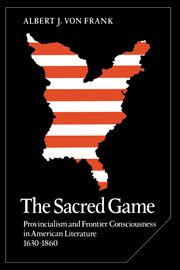Book contents
- Frontmatter
- Contents
- Dedication
- Preface
- Introduction: provincialism and the frontier
- 1 “But enmity this amity did break”
- 2 Brother Jonathan
- 3 “A musy in the thicket”
- 4 Geoffrey Crayon and the gigantic race
- 5 Hawthorne's provincial imagination
- 6 Working in Eden
- 7 Life as art in America
- 8 Reading God directly: the morbidity of culture
- Postscript: tradition and circumstance
- Notes
- Index
5 - Hawthorne's provincial imagination
Published online by Cambridge University Press: 07 October 2011
- Frontmatter
- Contents
- Dedication
- Preface
- Introduction: provincialism and the frontier
- 1 “But enmity this amity did break”
- 2 Brother Jonathan
- 3 “A musy in the thicket”
- 4 Geoffrey Crayon and the gigantic race
- 5 Hawthorne's provincial imagination
- 6 Working in Eden
- 7 Life as art in America
- 8 Reading God directly: the morbidity of culture
- Postscript: tradition and circumstance
- Notes
- Index
Summary
Voices of people talking on the other side of the river; the tones being so distinguishable, in all their variations, that it seemed as if what was being said might be understood; but it was not so.
A dream, the other night, that the world had become dissatisfied with the inaccurate manner in which facts are reported, and had employed me, with a salary of a thousand dollars, to relate things of public importance exactly as they happen.
– Nathaniel HawthorneIf it is true in general that American cultural life has been provincial and that it was made so by the attenuation of eastern or European culture transmitted and retransmitted under frontier conditions, it follows that this provincialism would eventually be diffused thoroughly and that signs of it would not, for example, be confined to statements about European culture, on the one hand, or about the frontier, on the other. If, as has been argued here, a “frontier consciousness” is at the center of what we recognize as nationally distinctive in the character of earlier American literature, it ought to be discernible in the works of major artists who have had little or nothing to do with obviously “western” experience. After all, a consciousness of any sort is not exclusively, or even primarily, a bundle of typical concerns or ideas, although for the sake of discussion it is often treated as if it were.
- Type
- Chapter
- Information
- The Sacred GameProvincialism and Frontier Consciousness in American Literature, 1630–1860, pp. 79 - 96Publisher: Cambridge University PressPrint publication year: 1985

